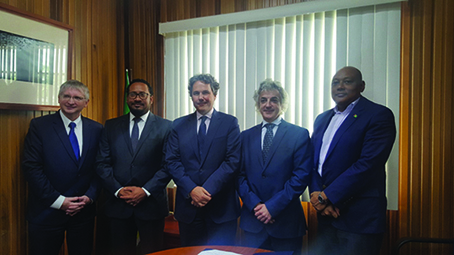Under the contract and an amendment signed between Guyana and Repsol Exploracion S.A, Guyana stands to gain a higher percentage of profits with increased production.
Production sharing agreements between government and oil companies vary, with some catering for a graduated scale of sharing of profit oil and others for an even split.
Some companies, such as Repsol, Tullow Oil and Eco (Atlantic) Oil and Gas, agreed to government’s profit split going as high as 60%, depending on the barrels of oil produced per day [BOPD], while others like ExxonMobil and Anadarko have agreed to a 50:50 share.
Under the oversight of Natural Resources Minister Raphael Trotman, the 2016 agreement signed between government and ExxonMobil has been heavily criticised and his APNU+AFC government has been pilloried over what has been seen as a poor deal.
Trotman has since announced the relinquishing of responsibilities for the petroleum sector to the Department of Energy.
Government last Monday released the contract signed between Guyana and Repsol in 2013 (and a 2016 addendum) and while it is similar to that of the agreement signed with Tullow Oil and Eco (Atlantic) Oil and Gas, this country stands to gain more on the ratio system used for deal.
Article 11:4 of the Repsol contract, which deals with cost recovery and production sharing, sets out the production sharing ratio.
It states that the balance of crude oil and/or natural gas available in any month after recoverable contract costs have been satisfied, shall be shared between the government and the contractor for each field in the following proportions:
However, the calculations differed by five thousand BOPD in the contract signed under the agreement between the APNU+AFC government with Tullow Guyana B.V. and Eco (Atlantic) Oil and Gas Incorporated as seen in the table below:
In releasing the contract and addendum, the Ministry of Natural Resources noted that Repsol, which has been present in Guyana since 1997, is currently focused on the Kanuku block, 150 kilometres offshore Guyana. “The company is targeting an oil prospect in the Kanuku block, where it plans to drill the first exploration well in 2019 to determine if hydrocarbons are present. The internal and external ESHIA (Environmental, Social and Health Impact Assessment) process will begin in 2018,” it added.
It was also noted that on May 23rd, Repsol’s Director of Global New Ventures Mikel Erquiaga and a team from the company met with Trotman and they reiterated the company’s commitment to its Guyana operations and an aggressive programme of activities that would move swiftly from seismic surveys to exploratory drilling.
Erquiaga also met with Minister of State Joseph Harmon and said that his visit to Guyana was a demonstration of the company’s recommitment to its investment in the country. “Our meeting was to reinforce Repsol’s continued support to Guyana, our commitment to continue having a strong relationship with the country and our commitment to continue investing in exploration activities offshore Guyana,” he said.
According to the Ministry of the Presidency, Harmon, in his remarks, said that the government looks forward to seeing positive results from the company’s work in Guyana.
“We are happy with the work done by Repsol over the years and I trust that over the coming months, that there will be more work done in the block assigned to you,” he added.
All oil contracts that have been brokered with exploration companies give Guyana a 1% royalty of the gross earnings, save for the agreement with ExxonMobil and its affiliates, which sees a 2% royalty being earned. The cost recovery limit is also set at 75% for all companies.
The companies that have blocks in the deep water area, offshore Guyana, are: Repsol and Tullow Oil (the Kanuku Block); Tullow (the Orinduik Block); Anadarko (the Roraima Block); Ratio Oil (the Kaieteur Block); Esso, CNOOC Nexen and Hess (the Stabroek Block); Esso, Mid Atlantic and JHI (the Canje Block; CGX (the Demerara and Corentyne blocks); ON Energy; and Nabi.
Nabi also has a graduated scale of profit share, where there is a 50:50 profit share if production is 50,000 barrels or below per day but if it should exceed that figure, government would receive a 55% share of the profit, while the company would receive the remainder.
CGX’s contract states that Guyana will receive 53%, while the company takes 47% after cost recovery. The contract with ON Energy is the same.








